


SEARCH MyCVEC
Seasonal Safety
Before, During and After a Storm
Hurricanes, tornadoes, snow and ice storms ... any one of these natural phenomena can cause prolonged power outages. Here are some tips that can help you weather through.
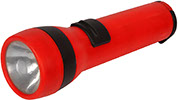 Before The Storm
Before The Storm
![]() Make sure flashlights, battery powered lanterns and or other sources of light are readily available
Make sure flashlights, battery powered lanterns and or other sources of light are readily available
![]() Make sure flashlight and radio batteries are fresh.
Make sure flashlight and radio batteries are fresh.
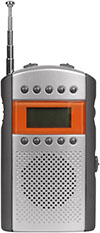
![]() Make sure you have an adequate supply of medicine, first aid supplies and baby items.
Make sure you have an adequate supply of medicine, first aid supplies and baby items.
![]() Homeowners with wells should draw an emergency water supply in case power to their electric water pumps is interrupted.
Homeowners with wells should draw an emergency water supply in case power to their electric water pumps is interrupted.
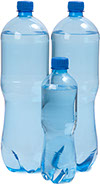
![]() Keep a supply of bottled water, non-perishable food items, batteries and firewood on hand.
Keep a supply of bottled water, non-perishable food items, batteries and firewood on hand.
![]() If you have an emergency heating source, learn how to use it properly to prevent fire and ensure proper ventilation.
If you have an emergency heating source, learn how to use it properly to prevent fire and ensure proper ventilation.
![]() Consider moving yourself and your family - especially those with special needs - to an alternate location during an extended outage.
Consider moving yourself and your family - especially those with special needs - to an alternate location during an extended outage.
![]() If you evacuate, shut off your electricity at the fuse box and /or breaker box. When you return, check for electrical damage, such as frayed wires, downed power lines, sparks or the smell of hot or burned insulation. An electrician must repair damage inside your house. Your electric cooperative can only hook up power to your house. Co-op personnel cannot repair your fuse or breaker box or make repairs on or inside your house.
If you evacuate, shut off your electricity at the fuse box and /or breaker box. When you return, check for electrical damage, such as frayed wires, downed power lines, sparks or the smell of hot or burned insulation. An electrician must repair damage inside your house. Your electric cooperative can only hook up power to your house. Co-op personnel cannot repair your fuse or breaker box or make repairs on or inside your house.
During The Storm
![]() During the storm get inside a building. Stay away from windows. Flying debris can cause injury. Do not use the phone or run water during lightning storms. Do not stand in water or take a bath or shower. Current from lightning can enter through plumbing and phone lines.
During the storm get inside a building. Stay away from windows. Flying debris can cause injury. Do not use the phone or run water during lightning storms. Do not stand in water or take a bath or shower. Current from lightning can enter through plumbing and phone lines.
![]() Don't leave candles unattended and keep them away from furniture, draperies and other flammable materials. Remember to keep children away from open flames.
Don't leave candles unattended and keep them away from furniture, draperies and other flammable materials. Remember to keep children away from open flames.
![]() Don't open freezers and refrigerators any more than absolutely necessary.
Don't open freezers and refrigerators any more than absolutely necessary.
![]() Listen to local radio stations for news about outages. Your electric cooperative makes a special effort to report the latest outage news to local radio stations and other media outlets.
Listen to local radio stations for news about outages. Your electric cooperative makes a special effort to report the latest outage news to local radio stations and other media outlets.
![]() Turn off your heating and air conditioning systems, as well as your electric range. Unplug sensitive electronic appliances such as TVs, VCRs, microwave ovens and computers. This will protect your appliances against power fluctuations that can occur when power is restored. Be sure to wait five to ten minutes before turning on appliances and heating systems after power is restored. This may prevent possible damage if you’re away when the power is restored.
Turn off your heating and air conditioning systems, as well as your electric range. Unplug sensitive electronic appliances such as TVs, VCRs, microwave ovens and computers. This will protect your appliances against power fluctuations that can occur when power is restored. Be sure to wait five to ten minutes before turning on appliances and heating systems after power is restored. This may prevent possible damage if you’re away when the power is restored.
After The Storm
![]() If power lines and poles are down in your yard or in the street, always treat them as if they were energized and dangerous. Never touch them! Stay away. Call your electric cooperative to report the location so repairs can be made as soon as possible.
If power lines and poles are down in your yard or in the street, always treat them as if they were energized and dangerous. Never touch them! Stay away. Call your electric cooperative to report the location so repairs can be made as soon as possible.
![]() Post-storm debris can hide power lines that have fallen. Fallen trees that contain energized power lines can energize any item it comes in contact with, such as a metal fence, a pond or standing water. Even the ground can be energized near fallen power lines. The real danger of fallen power lines is often hidden.
Post-storm debris can hide power lines that have fallen. Fallen trees that contain energized power lines can energize any item it comes in contact with, such as a metal fence, a pond or standing water. Even the ground can be energized near fallen power lines. The real danger of fallen power lines is often hidden.
![]() If your electric service is out, check with your neighbors to see if they have power. If they do, you may have only a blown fuse or a tripped breaker. Never replace a fuse or reset a circuit breaker with wet hands or while standing on a wet (or even damp) surface.
If your electric service is out, check with your neighbors to see if they have power. If they do, you may have only a blown fuse or a tripped breaker. Never replace a fuse or reset a circuit breaker with wet hands or while standing on a wet (or even damp) surface.
![]() If you're without electricity and want to use a portable generator, make sure you use it in a well-ventilated area. Don't connect the generator to your home's electrical panel or fuse boxes. It may cause electricity to feed back into the power lines, which can endanger linemen and damage electric service facilities.
If you're without electricity and want to use a portable generator, make sure you use it in a well-ventilated area. Don't connect the generator to your home's electrical panel or fuse boxes. It may cause electricity to feed back into the power lines, which can endanger linemen and damage electric service facilities.
![]() If possible, avoid using candles. If you must use candles, remember that open windows and gusty winds can knock them over or blow flammable materials into them, so be careful about where you place them.
If possible, avoid using candles. If you must use candles, remember that open windows and gusty winds can knock them over or blow flammable materials into them, so be careful about where you place them.
![]() If your power is out following a storm and you must cook food with Sterno or charcoal, remember to do so outside in a well-ventilated area. Cooking indoors with Sterno or charcoal will produce deadly carbon-monoxide fumes. Replenish your supplies of batteries, bottled water, non-perishable food items and firewood in preparation for future storms as soon as it’s reasonably possible.
If your power is out following a storm and you must cook food with Sterno or charcoal, remember to do so outside in a well-ventilated area. Cooking indoors with Sterno or charcoal will produce deadly carbon-monoxide fumes. Replenish your supplies of batteries, bottled water, non-perishable food items and firewood in preparation for future storms as soon as it’s reasonably possible.
Helping line crews is appreciated, but working with power lines and electricity requires a high degree of training. In order to restore power with the highest degree of safety, restoration must be accomplished in a certain order. Above all, the hard working men and women restoring your power appreciate your patience and understanding that they are doing everything they can to restore your power as quickly and safely as possible.
![]()
Holiday Safety Tips
1. Inspect electrical decorations for damage before use. Cracked or damaged sockets, loose or bare wires, and loose connections may cause a serious shock or start a fire.
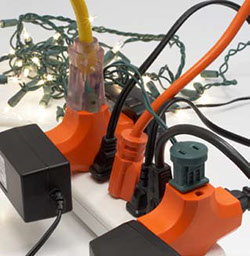 2. Do not overload electrical outlets. Overloaded electrical outlets and faulty wires are a common cause of holiday fires. Avoid overloading outlets and plug only one high-wattage appliance into each outlet at a time.
2. Do not overload electrical outlets. Overloaded electrical outlets and faulty wires are a common cause of holiday fires. Avoid overloading outlets and plug only one high-wattage appliance into each outlet at a time.
3. Never connect more than three strings of incandescent lights. More than three strands may not only blow a fuse, but can also cause a fire.
4. Keep Christmas trees fresh by watering daily. Dry trees are a serious fire hazard.
5. Use battery-operated candles. Candles start almost half of home decoration fires (NFPA).
6. Keep combustibles at least three feet from heat sources. A heat source that was too close to the decoration was a factor in half of home fires that began with decorations. (NFPA).
![]() Download the ESFI 2013 Holiday Safety Guide here (PDF).7. Protect cords from damage. To avoid shock or fire hazards, cords should never be pinched by furniture, forced into small spaces such as doors or windows, placed under rugs, located near heat sources, or attached by nails or staples.
Download the ESFI 2013 Holiday Safety Guide here (PDF).7. Protect cords from damage. To avoid shock or fire hazards, cords should never be pinched by furniture, forced into small spaces such as doors or windows, placed under rugs, located near heat sources, or attached by nails or staples.
8. Check decorations for certification label. Decorations not bearing a label from an Independent testing laboratory such as Underwriters Laboratories (UL), Canadian Standards Association (CSA) or Intertek (ETL) have not been tested for safety and could be hazardous.
9. Don't let cords be a tripping hazard. Be careful not to cross doorways or walkways with extension cords. And never run them under rugs and carpets!
10. Turn off, unplug, and extinguish all decorations when going to sleep or leaving the house. Unattended candles are the cause of one in five home candle fires. Half of home fire deaths occur between the hours of 11 PM and 7 AM (NFPA).
![]()
Hurricane Safety
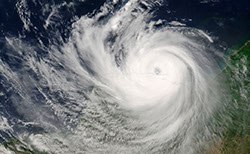 Hurricane season is June 1 until November 30. Central Virginia has been hit hard by some storms in the past, so be aware of weather forcasts during these months and be prepared.
Hurricane season is June 1 until November 30. Central Virginia has been hit hard by some storms in the past, so be aware of weather forcasts during these months and be prepared.
1. Locate the closest evacuation route to your home, and make sure you know that area well. It never hurts to know a backup route in case your conditions are dangerous and your first route unavailable!
2. Put together a basic disaster supply kit with items like: cash, water, non-perishable foods, battery-powered radio, flashlight, first aid kits, blankets, moist towelettes and tissues for sanitation. Be sure to keep this kit in a location that is easy to access! We have an extensive list of items to have on hand here.
3. If a hurricane threatens your home, stay up to date with the news. If ordered by local officials to leave immediately, do so! If not, be sure to find a safe location in your home to stay safe. You can read updates about CVEC outages here.
4. Know your home’s vulnerability to storm surge, flooding and winds. And know the difference between a declared “watch” and “warning.”
5. Do not immediately think that the storm has passed when the weather dies down. There are many dangers that can still occur such as the calm “eye” of the storm, or even tornadoes. Always wait until the area is officially declared safe before venturing out.
HOME | REPORT AN OUTAGE | PAY MY BILL | CONTACT CVEC
Phone: 434.263.8336 | Toll free: 800.367.2832 | Fax: 434.263.8339
Corporate Headquarters:
800 Cooperative Way
Arrington, VA 22922
Payments:
Dept. 1340 | PO Box 2153
Birmingham, AL 35287-1340
Correspondence:
P. O. Box 247
Lovingston, VA 22949
